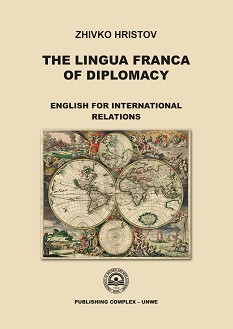"The textbook The Lingua Franca of Diplomacy: English for International Relations’ is a result of a years-long quest of the author for compiling a teaching aid of English for specific purposes in the fields of IR and foreign policy. This effort was necessitated by a practical reason - the absence of a relevant handbook, which has presented a major setback in the process of language training of bachelor degree students in IR and European Studies. Therefore, they constitute the main target group of potential users. It can also be of interest for students, specialising in Political Science, International Security, and Economics.
The textbook is not only intended for speakers of Bulgarian only: exercise instructions as well as internet sources for individual and group work are in English, with the sole exception of translation exercises. With a view to the Common European Framework of Reference level (B2) of the textbook, it is assumed that not using the students’ native tongue will not hinder the acquisition of new vocabulary or grammar. Regarding the localisation aspect of the learning experience, the individual speaking tasks involve issues, relating to both Bulgarian and world historical and IR topics, which will render engagement of various users.
The textbook consists of eight Units, which cover basic areas of IR and diplomacy such as historical grounds, privileges and immunities, ranks, and correspondence. Units are organised in such a way as to provoke interest at the beginning with four questions, relevant to the unit theme. Each unit involves two texts presenting different but complementary perspectives. The texts belong to erudite authors, taking professional interest in diplomacy and IR: R. G. Feltham, J. Baylis and S. Smith, S. McGlinchey. They have been adapted with a view to their accessibility for Upper Intermediate learners of English. Glossaries of main terms and concepts of the respective text precede it to facilitate specialised vocabulary acquisition.
A set of various exercises follows each Reading item: Reading Comprehension and Vocabulary after the first and second one; Writing, Speaking, and Grammar Points with relevant exercises add up to the latter after the second one. Keys are provided at the end of the book. Stress is put on three skills: Reading, Writing and Speaking. Writing involves tasks for composing Verbal Notes, the prevalent form of diplomatic correspondence. Regrettably, there are scarcely any appropriate sources for Listening in this field and level of language acquisition. Notwithstanding, teachers are free to design own tasks from video/audio sources in the Internet, provided they would find them suitable for the learners.
Approbation of the textbook with students from Bulgaria and Ukraine demonstrated that covering the contents, allowing for time allotted to presentations in class and writing, would require 100 to 120 lessons’ course. That, however, strongly depends on the level of language proficiency of the auditorium.
I express special thanks to my colleague Valentina Georgieva for her invaluable help in adapting the original texts, as well as in diversifying the form and content of the activities. I hope that future users will find this book useful and practical in achieving their career goals."
Zhivko Hristov



